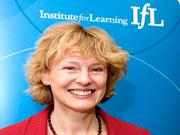Sparking the fire

The Skills Commission’s report into teacher training in vocational education, published last month, was clearly fuelled by a fiery enthusiasm and a passionate commitment to the teaching profession and to vocational education, which the Institute for Learning (IfL) wholeheartedly shares. We also fully support the plaudits given to teachers and trainers across Further Education and skills – our members – and their important contribution to 14-19 education and to the economy and society.
The report includes evidence from IfL and other organisations and individuals across the sector. Its 26 recommendations make an eye-catching à la carte menu, mostly of welcome and appetising propositions, but with a few not-so-attractive options too. In IfL’s view, some of the ideas don’t quite work, or seem a little underdone.
We welcome hugely the demand that vocational teachers should be accorded high status and parity with teachers of other subjects across the Further Education and schools systems, and that FE teachers with Qualified Teacher Learning and Skills (QTLS) should be recognised as qualified teachers in a school setting. These long-awaited developments are in the best interests of young people and their learning, the nation and the teaching profession. We agree upon the need for bridging courses to be developed in short order to make it easier for further education teachers with QTLS to teach in schools, so that Qualified Teacher Status (QTS) and QTLS are on a par.
We were especially pleased to see IfL’s continuing professional development (CPD) framework being singled out as a sound model that could be applied to the wider teaching profession in other sectors. We also support the recommendations to extend the master’s degree in teaching and learning (MTL) to FE teachers, and to include mentoring in Ofsted’s framework for college inspections. It was good to see the importance given throughout the report to research, CPD and teachers’ dual professionalism, all of which IfL promotes.
IfL is not yet sure, however, about the signature dish on the menu – ‘a unified QTS’. Our initial reservations are partly about the descriptions used: the term ‘convergence’ to a ‘universal QTS’ suggests a single route to becoming a qualified teacher with full professional status. It also implies the unified QTS for schoolteachers being applied to all teachers, which we do not believe to be the right solution.
Initial teacher training (ITT) in Further Education has been built on the solid foundations of dual professionalism. ITT must be fit for purpose to meet the needs of our learners across Further Education and skills – aged from 14 to 90 and older – for formal or informal, academic, vocational, skills and leisure learning, in colleges and providers and in the workplace, as well as the needs of employers. This is reflected in Lifelong Learning UK’s standards and the current approach to ITT in Further Education and skills, and is seen as a key success factor in FE teacher and trainer recruitment and effective teaching and training.
Instead of a ‘universal QTS’, IfL would rather explore a framework that leads to a more comprehensive ‘professional teacher status’, offering flexibility and transferability to ensure that we retain the distinctive features of our Further Education and skills sector and the importance of vocational routes into the teaching profession across our sector. The framework needs to be coherent and flexible to meet the diverse and distinctive requirements of Further Education and skills, and the teachers of young people and adults, as well as the range of schools.
IfL is keen to work positively and in partnership with the Skills Commission and other agencies across Further Education and schools to develop this thinking. The seeds for a revised approach may be in ‘a common core of training guided by a commonality within difference’, mentioned in the report.
IfL believes that success breeds success. The first important step for us is to succeed in creating a ready route for Further Education teachers with QTLS to be able to teach in schools, fully recognised as qualified teachers. In these straitened times, we believe that until the government and agencies have proved that this is in place and working, it would not be right to commit resources to grander architecture or to reengineering policy landscapes.
2010 must be the year when the first teachers with QTLS are able to join forces with their schoolteacher counterparts and teach in a school setting the same the same courses, and often the same young learners, that they can and do teach successfully in Further Education colleges and work-based learning contexts.
IfL will work with other agencies to make sure that some of our members with QTLS are the pioneers, bringing their expertise in teaching vocational subjects into schools, complementing and building on the excellent work already being done by so many schoolteachers.
Who would resist our Further Education teachers and trainers having the chance to share their rich experiences and vocational expertise; help inspire young learners and motivate tomorrow’s workforce; and perhaps instil in them a lifelong love of learning?
If we care about brilliant teaching and learning, let’s not hold back our teachers and trainers from teaching across settings – let’s spark the fire!
Toni Fazaeli is chief executive of the Institute for Learning (IfL), the professional body for more than 200,000 teachers, trainers, tutors and student teachers across the Further Education and skills sector
Read other FE News articles by Toni Fazaeli:
Ofsted reports ‘did do better’
IfL seeks recognition of professional status for college teachers and trainers in schools
IfL chief reveals how teachers and trainers are coming through the recession











Responses